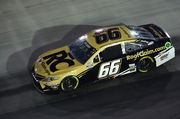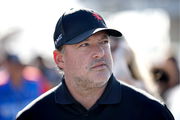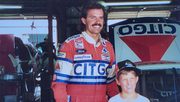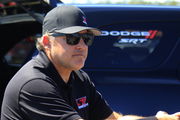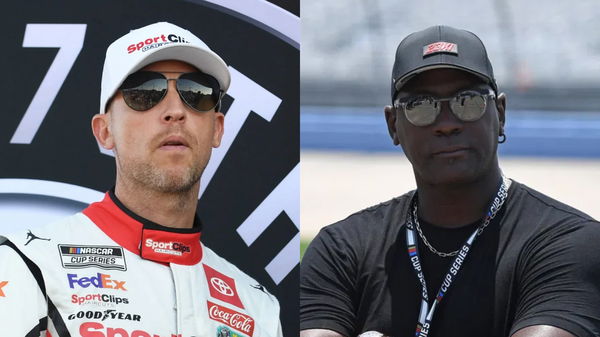
via Imago
Image Credits: Imago

via Imago
Image Credits: Imago
The antitrust lawsuit against NASCAR is at a critical juncture. In a recent development, Judge Kenneth Bell granted a preliminary injunction favoring 23XI Racing and Front Row Motorsports. This ruling, effective for the 2025 season, permits both teams to field three cars in all NASCAR Cup Series races, enjoying the same privileges as chartered teams. However, the ruling does not come without stipulations. Judge Bell deemed the release clause in Section 10.3 of the NASCAR agreement—prohibiting teams from pursuing antitrust lawsuits—unlawful.
While this decision is a significant win for 23XI and Front Row, it has set the stage for an intense legal battle, as NASCAR has made it clear they plan to fight back. The decision has sparked widespread discussion among fans and analysts alike. One of the most intriguing exchanges occurred on X, where racing journalist Matt Weaver posed a critical question about the implications of the case. The post caught the attention of Denny Hamlin, co-owner of 23XI Racing with Michael Jordan, whose reaction suggested he was pleased with the ongoing legal progress.
ADVERTISEMENT
Article continues below this ad
Denny Hamlin praises Weaver’s insights
NASCAR has announced its intention to appeal Judge Kenneth Bell’s preliminary injunction to the Fourth Circuit Court, seeking to delay the ruling. The governing body argues that the injunction could lead to irreversible consequences if implemented immediately. In response, Judge Bell granted NASCAR’s request for a temporary delay, instructing 23XI Racing and Front Row Motorsports to submit any opposition filings by 10 a.m. today.
The judge has expressed his intent to deliver a final decision by the end of the day. Notably, NASCAR will not have an opportunity to file a rebuttal after the teams submit their responses. At the heart of the appeal is NASCAR’s effort to maintain what it defines as the “status quo”—allowing both teams to operate with two chartered cars but without the financial benefits outlined in the charter agreement, which the teams did not sign.
This sparked a fan query on X, where someone asked motorsports journalist Matt Weaver, “How can they claim that the injunction maintains the status quo? Status quo would be both teams having two charters.” Weaver replied, clarifying, “The injunction effectively restores the conditions, more or less, to the summer right before negotiations broke down in which 23XI and Front Row had two charters and agreed to purchase a third each. NASCAR, of course, pushes back on that last inclusion the most.”
In today’s ruling, we can expect two outcomes: the court will either deny or grant the request. If the former happens, the old injunction will continue to be effective. In that case, the teams will be allowed three charters and privileges of charters, like those that the other teams enjoy. If the court grants the delay, the SHR transaction will wait while the Fourth Circuit of Appeals reviews the original decision. Denny Hamlin was in awe of how much Law Matt Weaver had learned. He said under Weaver’s post, “You’ve gotten quite the education on law Matt. Congrats!”
You’ve gotten quite the education on law Matt. Congrats!
— Denny Hamlin (@dennyhamlin) December 23, 2024
Matt Weaver has been covering the case in detail for Sportsnaut and is the owner of Short Track Scene, a motorsport publication. He was a dirt racer who eventually picked up the metaphorical pen while at the University of Alabama. Plus, from NASCAR to IndyCar and Dirt Sprints, he has covered it all in his 13 years in the journalism field.
Trending
What is the context of the injunction?
On October 2, 2024, the plaintiffs filed a lawsuit claiming that NASCAR’s charter agreements violate antitrust regulations by obstructing competition. And, since NASCAR doesn’t shy away from digging its heels or taking on challenges, the legal accusations and moves go on. In this particular case, NASCAR couldn’t throw out the argument on the technicality of Section 10.3. Regarding the clause, the Judge noted, “In practical effect, the question before the Court is — Can a monopolist require that a party agree to release the monopolist from all claims that it is violating the antitrust laws as a condition of doing business? The answer is no.”
“We welcome today’s decision by Judge Bell granting a preliminary injunction in our favor…We are confident in the strength of our case and will continue to fight so that racing can thrive and become a more competitive and fair sport in ways that benefit teams, drivers, sponsors, and, most importantly, our fans,” the teams had said.
ADVERTISEMENT
Article continues below this ad
NASCAR expressed strong criticism towards the new judge last week. It implied that the judge had a fundamental “misunderstanding” of how charters function about the law. The sanctioning body was not happy with the two teams, including their charter transaction approval request in a legal response. It should have ideally been in the initial filing. So far, the only status quo maintained is that NASCAR says that there was no wrongdoing on its part.
Although, it’s important to mention that the court has established a schedule to address the antitrust claims before the 2026 season. Of course, if the two parties manage to agree, that could change things. What do you think the Judge will rule today?
ADVERTISEMENT
Article continues below this ad
ADVERTISEMENT
ADVERTISEMENT
ADVERTISEMENT
ADVERTISEMENT
